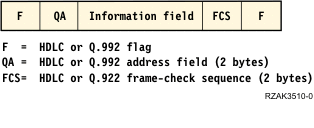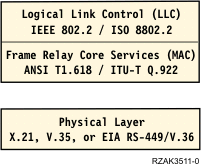Frame relay is a communications networking protocol that defines how frames are routed through a fast-packet network based on the address field in the frame. Frame relay takes advantage of the reliability of data communications networks to minimize the error checking done by the network nodes. This provides a packet-switching protocol similar to but much faster than the X.25 standard.
The high speed that you can obtain through frame-relay networks makes them well suited for wide area network (WAN) connectivity. Administrators commonly use frame relay to connect two or more local area network (LAN) bridges over large distances.
The following figure shows the frame format that frame-relay networks use.

Frame-relay network architecture is based on the integrated systems digital network (ISDN) packet-mode bearer services. Table 1 shows the standards, either pending or approved, that define the services and the user-to-network interface of frame-relay networks.
| ANSI standard | Equivalent ITU-T standard |
|---|---|
| T1.606, Frame Relay Bearer Services (FRBS) Architectural Framework | I.233, ISDN Frame Mode Bearer Service |
| T1.618, FRBS Core Aspects | Q.922, ISDN Extended Data Link (LAP-E) |
| T1.617, FRBS Signaling | Q.933, Frame Mode Bearer Services (FMBS) Signaling |
| T1.606 Addendum 1, FRBS Congestion Management | I.370, ISDN FMBS Congestion Management |
The IBM®  iSeries™ system
implementation of frame-relay network support uses protocol headers as defined
in the TCP/IP Request for Comment 1490 (RFC 1490).
iSeries™ system
implementation of frame-relay network support uses protocol headers as defined
in the TCP/IP Request for Comment 1490 (RFC 1490).
Frame-relay networks achieve their greater efficiency by minimizing the error checking done by nodes within the network. For Systems Network Architecture (SNA), iSeries frame-relay support uses IEEE 802.2 logical link control to provide flow control and error recovery functions (see Figure 2).
As indicated above, you can make the connection between the iSeries system and the frame-relay network by using X.21, V.35, or RS-449 physical interfaces.
